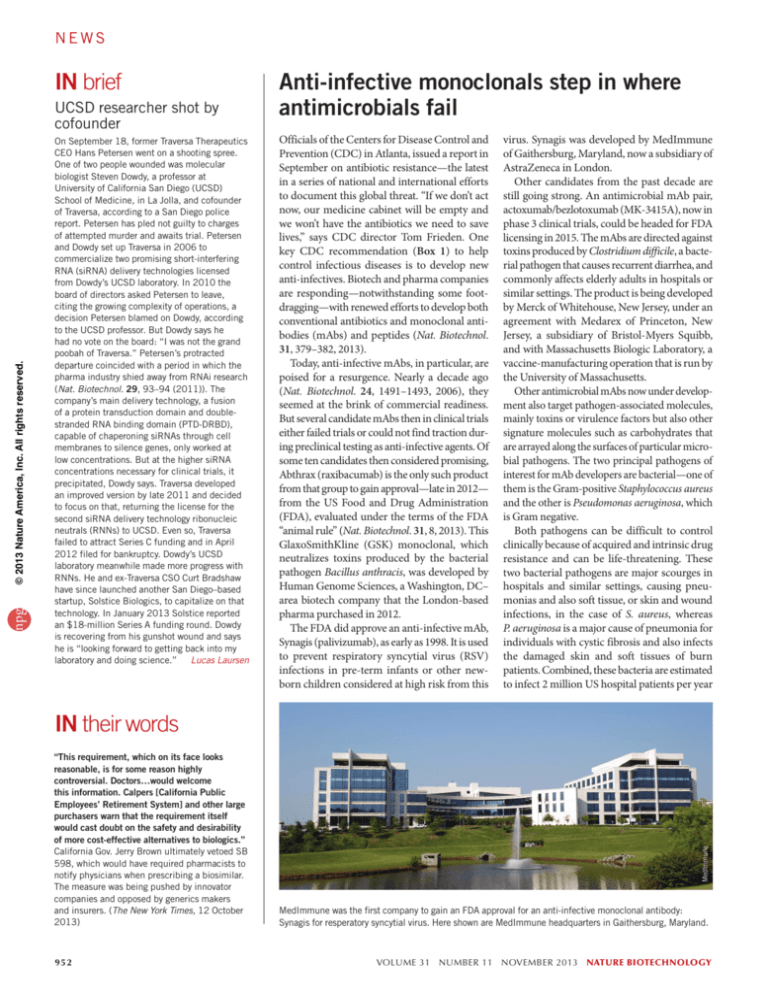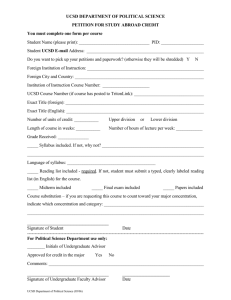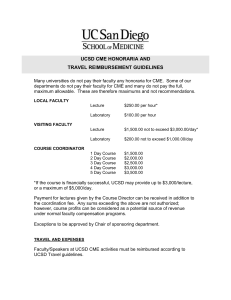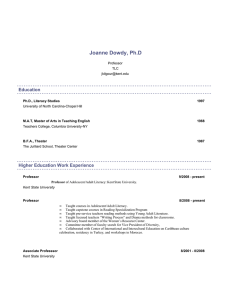
NEWS
in brief
On September 18, former Traversa Therapeutics
CEO Hans Petersen went on a shooting spree.
One of two people wounded was molecular
biologist Steven Dowdy, a professor at
University of California San Diego (UCSD)
School of Medicine, in La Jolla, and cofounder
of Traversa, according to a San Diego police
report. Petersen has pled not guilty to charges
of attempted murder and awaits trial. Petersen
and Dowdy set up Traversa in 2006 to
commercialize two promising short-interfering
RNA (siRNA) delivery technologies licensed
from Dowdy’s UCSD laboratory. In 2010 the
board of directors asked Petersen to leave,
citing the growing complexity of operations, a
decision Petersen blamed on Dowdy, according
to the UCSD professor. But Dowdy says he
had no vote on the board: “I was not the grand
poobah of Traversa.” Petersen’s protracted
departure coincided with a period in which the
pharma industry shied away from RNAi research
(Nat. Biotechnol. 29, 93–94 (2011)). The
company’s main delivery technology, a fusion
of a protein transduction domain and doublestranded RNA binding domain (PTD-DRBD),
capable of chaperoning siRNAs through cell
membranes to silence genes, only worked at
low concentrations. But at the higher siRNA
concentrations necessary for clinical trials, it
precipitated, Dowdy says. Traversa developed
an improved version by late 2011 and decided
to focus on that, returning the license for the
second siRNA delivery technology ribonucleic
neutrals (RNNs) to UCSD. Even so, Traversa
failed to attract Series C funding and in April
2012 filed for bankruptcy. Dowdy’s UCSD
laboratory meanwhile made more progress with
RNNs. He and ex-Traversa CSO Curt Bradshaw
have since launched another San Diego–based
startup, Solstice Biologics, to capitalize on that
technology. In January 2013 Solstice reported
an $18-million Series A funding round. Dowdy
is recovering from his gunshot wound and says
he is “looking forward to getting back into my
laboratory and doing science.” Lucas Laursen
Officials of the Centers for Disease Control and
Prevention (CDC) in Atlanta, issued a report in
September on antibiotic resistance—the latest
in a series of national and international efforts
to document this global threat. “If we don’t act
now, our medicine cabinet will be empty and
we won’t have the antibiotics we need to save
lives,” says CDC director Tom Frieden. One
key CDC recommendation (Box 1) to help
control infectious diseases is to develop new
anti-infectives. Biotech and pharma companies
are responding—notwithstanding some footdragging—with renewed efforts to develop both
conventional antibiotics and monoclonal antibodies (mAbs) and peptides (Nat. Biotechnol.
31, 379–382, 2013).
Today, anti-infective mAbs, in particular, are
poised for a resurgence. Nearly a decade ago
(Nat. Biotechnol. 24, 1491–1493, 2006), they
seemed at the brink of commercial readiness.
But several candidate mAbs then in clinical trials
either failed trials or could not find traction during preclinical testing as anti-infective agents. Of
some ten candidates then considered promising,
Abthrax (raxibacumab) is the only such product
from that group to gain approval—late in 2012—
from the US Food and Drug Administration
(FDA), evaluated under the terms of the FDA
“animal rule” (Nat. Biotechnol. 31, 8, 2013). This
GlaxoSmithKline (GSK) monoclonal, which
neutralizes toxins produced by the bacterial
pathogen Bacillus anthracis, was developed by
Human Genome Sciences, a Washington, DC–
area biotech company that the London-based
pharma purchased in 2012.
The FDA did approve an anti-infective mAb,
Synagis (palivizumab), as early as 1998. It is used
to prevent respiratory syncytial virus (RSV)
infections in pre-term infants or other newborn children considered at high risk from this
virus. Synagis was developed by MedImmune
of Gaithersburg, Maryland, now a subsidiary of
AstraZeneca in London.
Other candidates from the past decade are
still going strong. An antimicrobial mAb pair,
actoxumab/bezlotoxumab (MK-3415A), now in
phase 3 clinical trials, could be headed for FDA
licensing in 2015. The mAbs are directed against
toxins produced by Clostridium difficile, a bacterial pathogen that causes recurrent diarrhea, and
commonly affects elderly adults in hospitals or
similar settings. The product is being developed
by Merck of Whitehouse, New Jersey, under an
agreement with Medarex of Princeton, New
Jersey, a subsidiary of Bristol-Myers Squibb,
and with Massachusetts Biologic Laboratory, a
vaccine-manufacturing operation that is run by
the University of Massachusetts.
Other antimicrobial mAbs now under development also target pathogen-associated molecules,
mainly toxins or virulence factors but also other
signature molecules such as carbohydrates that
are arrayed along the surfaces of particular microbial pathogens. The two principal pathogens of
interest for mAb developers are bacterial—one of
them is the Gram-positive Staphylococcus aureus
and the other is Pseudomonas aeruginosa, which
is Gram negative.
Both pathogens can be difficult to control
clinically because of acquired and intrinsic drug
resistance and can be life-threatening. These
two bacterial pathogens are major scourges in
hospitals and similar settings, causing pneumonias and also soft tissue, or skin and wound
infections, in the case of S. aureus, whereas
P. aeruginosa is a major cause of pneumonia for
individuals with cystic fibrosis and also infects
the damaged skin and soft tissues of burn
patients. Combined, these bacteria are estimated
to infect 2 million US hospital patients per year
in their words
“This requirement, which on its face looks
reasonable, is for some reason highly
controversial. Doctors…would welcome
this information. Calpers [California Public
Employees’ Retirement System] and other large
purchasers warn that the requirement itself
would cast doubt on the safety and desirability
of more cost-effective alternatives to biologics.”
California Gov. Jerry Brown ultimately vetoed SB
598, which would have required pharmacists to
notify physicians when prescribing a biosimilar.
The measure was being pushed by innovator
companies and opposed by generics makers
and insurers. (The New York Times, 12 October
2013)
952
MedImmune
npg
© 2013 Nature America, Inc. All rights reserved.
UCSD researcher shot by
cofounder
Anti-infective monoclonals step in where
antimicrobials fail
MedImmune was the first company to gain an FDA approval for an anti-infective monoclonal antibody:
Synagis for resperatory syncytial virus. Here shown are MedImmune headquarters in Gaithersburg, Maryland.
volume 31 NUMBER 11 NOVEMBER 2013 nature biotechnology








